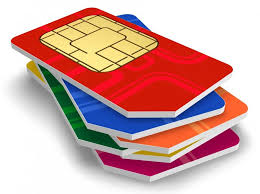Telecom subscribers who want to swap their subscriber identification module (SIM) cards will need to secure bank approval that will include biometric verification, it was learnt at the weekend.
It is all part of a new regulation initiated by the Central Bank of Nigeria (CBN) and the Nigeria Communication Commission (NCC) to tackle SIM-swap related e-fraud.
The policy could take effect before December.
CBN Director, Banking & Payments System Department, ‘Dipo Fatokun, who spoke at the weekend, said the regulators had discovered that some e-fraudsters specialised in swapping the SIM card of victims, taking huge sums of money from their accounts.
He said bank customers lost over N2 billion to e-fraud in 2016, and that both regulators were ready to implement the regulation that will require bank approval and biometric identification before a telecom subscriber’s SIM Card is swapped.
Biometric verification is any means by which a person can be uniquely identified by evaluating one or more distinguishing biological traits.
Unique identifiers include fingerprints, hand geometry, earlobe geometry, retina and iris patterns, voice waves, deoxyribonucleic acid (DNA) and signatures.
Fatokun said e-fraud remains the biggest challenge facing the electronic payment sector and needs to be collectively tackled by customers, banks and financial sector regulators.
Fatokun, who spoke at with finance correspondents in in Lagos at the weekend, said e-fraud has never been completely eliminated, adding that e-fraud not only leads to loss of funds, but reduces confidence of customers using e-payment channels.
The CBN director, who spoke on the theme: “Electronic Payments Industry’s Performance and Regulatory Issues”, described e-payment as any form of payment that allows the use of electronics system to initiate, authorise and confirm the transfer of money between two parties.
He explained how the SIM swap e-fraudsters operate: “Some of the fraud we are still battling with is the issue of SIM swap. We have heard of instances where people would say for three days my phone did not work. And because many of us carry more than one phone, if one is not working, at least one will work”.
“So, what they do is that they swap your phone. That is, they just walk up to a service provider and claim to be the owner of the line. Most often, they have studied that number and they have collaborators, probably in the bank. And because the process for doing a change of SIM card is so loose, the telecom company would change the SIM card for the person and so he assumes the phone number,” he said.
Fatokun added: “What does the fraudster do? He puts the SIM card in another phone and starts using the Unstructured Supplementary Service Data (USSD) to make transfers out of the account into another account. So, we are working with the NCC to tighten the process of SIM card swap. It may include biometrics and a unique number may be required.
“In Nigeria, we have consistently over the last three years reduced the value of electronic fraud. The game changer is the Bank Verification Number (BVN). It is not only helping us to identify who owns what, but going forward, just as it was announced by the Bankers’ Committee at the last meeting, the BVN would be used as an instrument to track fraudsters in the system.
He said when electronic fraud happens, money is moved from one account to another account. That other account that money is moved to, the owner can be identified. And when such owners can be identified, they can be blacklisted or watch listed.
He said fraudsters can be identified and if possible taken out of the system.
“So, the BVN is going to be a game changer in the respect. We are working on the final framework and when it is concluded, it would be issued to the industry,” he stated.


ConversionConversion EmoticonEmoticon